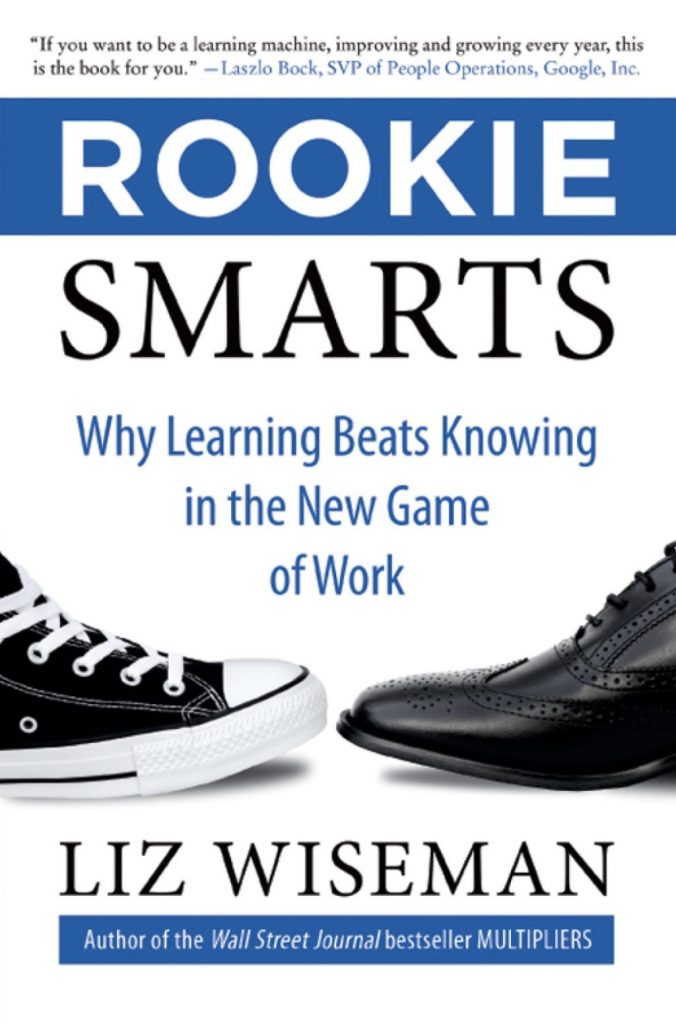Key Quote:
“Perpetual rookies are skilled at toggling between states of mind, between their veteran savvy and their rookie smarts…the best leaders know when it is time to stop, unlearn and relearn” (p. 155). — Liz Wiseman
Key Points and Concepts
Wiseman describes four rookie mindsets that veterans can practice: Backpacker, Hunter-Gatherer, Firewalker, and Pioneer. By unlearning, relearning, and staying hungry, veterans can become perpetual rookies and embody an insatiable curiosity, the humility of a lifelong student, and an intentional playfulness for the world around them.
The Reason for the Rookie
The message of “Knowledge is Power” is a relic. The heightened pace of innovation and discovery leads to a workforce that is constantly updated with new information. Knowing how to learn is more critical than knowing in most work environments.
While it’s easy to envision rookies as “idea-wielding risk takers,” their style is actually more calculated and incremental than a typical veteran’s style (p. 26). Wiseman found four other surprising facts about rookies that play large roles in their success:
1. Rookies have higher levels of self-awareness than veterans.
2. Rookies seek out more expertise than veterans when solving a problem, despite having weaker networks.
3. Rookies deliver results faster than veterans.
4. Rookies are more attuned to politics than veterans, although they are less politically savvy.
Rookies thrive in environments that:
• Are new or uncharted.
• Have a short-cycle rather than a long-cycle.
• Have multiple answers.
• Are complex or have too much information for one person to know.
Rookie Mindset I: Backpacker
Rookies act like backpackers rather than sedentary caretakers. Rather than a trophy case of successes to look at, rookies have nothing to lose or weigh them down. They can explore and see new things where veterans cannot because their existing knowledge interferes.
Rookies are free to wander, and because of their humility and passion for the journey, they do so “wholeheartedly—without reservation, without exception, without limitation” (p. 65).
• “Sometimes not knowing is better than knowing. In our state of relative cluelessness, we don’t yet know that a new opportunity is impossible. So, we willingly embark” (p. 68).
•To behave like a rookie backpacker, practice asking naïve questions. Naïve questions are natural and often cut to the core of an issue without being assuming or pedantic (p. 55).
• Wiseman also recommends that veterans “ditch the heavy pack” of previous successes, failures, and knowledge in order to move more freely and truly see the world around them as a rookie would (p. 68).
Rookie Mindset II: Hunter-Gatherer
Rookies act like hunter-gatherers rather than local guides. While guides are familiar enough in their environment to give advice, hunter-gatherers must learn this knowledge and expertise. Rookies are constantly in sense-making mode and are more likely to reach out for guidance (p. 97).
Because rookies are new to their environment, they are unsettled and somewhat disoriented. This disorientation helps rather than hinders; “with much out of focus, they zoom in on the immediate problems… are keenly aware of where they stand and see their deficiencies to a far greater extent than their experienced colleagues” (p. 81).
Wiseman recommends that veterans take opportunities to change their perspective or learn from new knowledge sources in order to become more like a hunter-gatherer. Exercises like reverse mentoring, swapping jobs for a day, and talking to strangers are all ways to find new approaches and new expertise (p. 94).
Rookie Mindset III: Firewalker
Rookies act like firewalkers rather than marathon runners. While veterans can operate confidently at a steady pace, they forget about checking in with stakeholders along the way. Firewalkers, on the other hand, lack this confidence and must move “cautiously but quickly, seeking feedback to calibrate their performance and close the gap” (p. 121).
Rookies don’t lack self-confidence; they lack situational confidence. Wiseman’s research revealed that the anxiety from situational confidence is more productive than debilitating. It fuels rookies to move past their comfort zone and impress their coworkers and bosses. Veterans, however, are more likely to be impeded by pressure in situations in which they have more experience and situational confidence (p. 106).
• University College London Psychology of Business professor, Tomas Chamorro-Premuzic, says that it’s better to have low self-confidence in most business situations. Lower confidence “helps people recalibrate and causes them to pay attention to negative feedback, work harder, and prepare more thoroughly” (p. 107).
• Contrary to popular belief, rookies operate in a low-risk manner. What looks like a big leap is often a quick change followed by a series of feedback-driven, iterative fast steps. Small, calculated steps reduce risk (p. 110).
Rookie Mindset IV: Pioneer
Rookies act more like pioneers than settlers. In uncharted territory, rookies must tirelessly improvise to meet basic demands. Veterans have access to more resources but end up following protocol that does not allow new ideas to grow.
Sometimes, situational motivation is more powerful than self-motivation: Desperation beats aspiration when we are trying to tackle a big project or task (p. 175).
A lack of resources and constraints encourage creative thinking, innovation, and discovery. To become more like pioneers, veterans should push themselves into discomfort zones and “burn the boats” to ensure they don’t retreat (p. 135).
Becoming a Lifelong Rookie
Rookie energy is infectious. When visiting Huntington Beach, CA, Wayne “Rabbit” Bartholomew, a world champion Australian surfer, chose to surf on the less prime waves with the younger, less-experienced surfers, while the top surfers surfed the better waves (p. 145).
Lifelong rookies are insatiably curious, humble students, and are playfully engaged in their goals. More importantly, they are deliberate. They are mindful and intentional in everything they do and are therefore able to hit the “refresh” button with every challenge.
• “Perpetual rookies are skilled at toggling between states of mind, between their veteran savvy and their rookie smarts…the best leaders know when it is time to stop, unlearn and relearn” (p. 155).
Rookies know that the joy is in learning, not knowing or reaching apex. They are always looking for a new hill to climb or wave to ride and are willing to move themselves outside of their comfort zone or preconceived success to do so (p. 160).
Learning and mastering something is one of life’s greatest challenges. “Taking on more work can be exhausting, and yet, ironically, the antidote to this strain of burnout isn’t less work. The cure of burnout is harder work” (p. 164).
After the last practice before the 2013 NFL NFC Championship game, San Francisco 49ers Head Coach, Jim Harbaugh, placed a poster in each player’s locker. The poster included the player’s high school photograph, the name of his school, and his high school ranking and stats. The photos transported the players to a time when they played with nothing to lose; they were displaced from veteran comfort and reminded what it was like to play like a rookie. The next day, after trailing by 17 points, the 49ers beat the Atlanta Falcons 28-24.
The Rookie Organization
Rookies thrive best under leaders that “give them freedom to explore new possibilities coupled with enough responsibility to propel them up a learning curve” (p. 191). This includes carefully sizing stretch assignments, providing clear direction and access to experts, and arranging a safety net to catch them if they fall.
Pair rookie smarts with veteran savvy. Look for the following common behaviors and traits:
• The ground and the spark—The veteran brings clarity and gravitas while the rookie brings energy and determination.
• The talent scout and the new talent—The veteran sees the potential and promise of the novel ideas of the rookie.
• The adviser and the entrepreneur—The veteran knows how the world works and guides the entrepreneur who wants to change the world.
• A hetero-genius team—When the disparate contributions of experience and naïveté are appreciated, the combination sparks collective brilliance (p. 221).
• Instead of hiring for experience, use rookie traits and mindsets as key behaviors. Curiosity, humility, playfulness, and intentionality are all indicative of learning agility (p. 202). Newcomers can bring valuable knowledge and skill, “but their greatest value comes in what they will learn while working” (p. 213).
Wiseman, L. (2014). Rookie Smarts. Why Learning Beats Knowing in the New Game of Work. New York: HarperCollins.

Rookies act like hunter-gatherers rather than local guides. While guides are familiar enough in their environment to give advice, hunter-gatherers must learn this knowledge and expertise. Rookies are constantly in sense-making mode and are more likely to reach out for guidance.
Rookies know that the joy is in learning, not knowing or reaching apex. They are always looking for a new hill to climb or wave to ride and are willing to move themselves outside of their comfort zone or preconceived success to do so.
Instead of hiring for experience, use rookie traits and mindsets as key behaviors. Curiosity, humility, playfulness, and intentionality are all indicative of learning agility. Newcomers can bring valuable knowledge and skill, “but their greatest value comes in what they will learn while working.”
